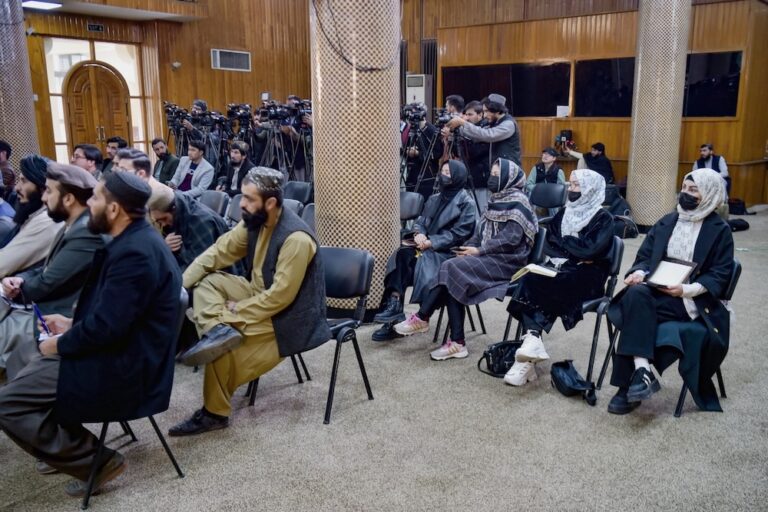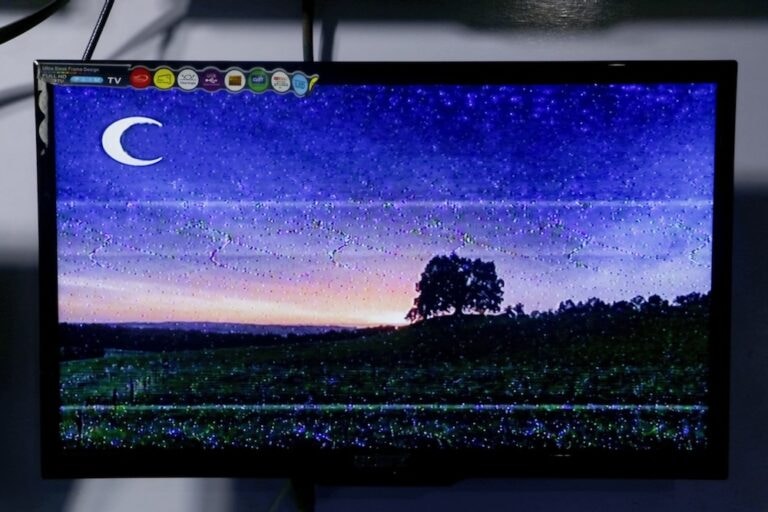(ARTICLE 19/IFEX) – The following is an ARTICLE 19 press release: ARTICLE 19 WELCOMES KABUL DECLARATION ON INDEPENDENT AND PLURALISTIC MEDIA Today in Kabul, an international seminar bringing together representatives of the Afghan government, local civil society and the international community adopted a Declaration on Promoting an Independent and Pluralistic Media in Afghanistan. The Declaration […]
(ARTICLE 19/IFEX) – The following is an ARTICLE 19 press release:
ARTICLE 19 WELCOMES KABUL DECLARATION ON INDEPENDENT AND PLURALISTIC MEDIA
Today in Kabul, an international seminar bringing together representatives of the Afghan government, local civil society and the international community adopted a Declaration on Promoting an Independent and Pluralistic Media in Afghanistan.
The Declaration calls on the Afghan authorities to remove all restrictions on freedom of the media, such as the requirement to obtain a licence to publish a newspaper, and to ensure that journalists will be free to publish critical reports without fear of reprisal. In addition, the Declaration calls on the authorities to introduce freedom of information legislation and to transform Radio-Television Afghanistan into a public service broadcaster.
ARTICLE 19’s Director, Andrew Puddephatt said:
“This Declaration is a milestone in the process of developing a free, independent and pluralistic media, key to the on-going process of democratisation and development in Afghanistan. We call on the Afghan government to fully implement the declaration’s provisions and offer our support in the process”.
Notes to editors:
1. A copy of the Declaration is attached [see Annex].
2. The International Seminar on Promoting Independent and Pluralistic Media in Afghanistan took place in Kabul from 3-5 September 2002. It was called by the Afghan Minister for Information and Culture and co-sponsored by a number international agencies, including UNESCO and UNAMA (the United Nations Assistance Mission in Afghanistan). ARTICLE 19 participated in the Seminar.
3. The International Seminar endorsed the Policy Declaration issued by the Ministry of Information and Culture on 6 June 2002.
4. For more information, contact Peter Noorlander, Legal Officer, or Rosaini Sulaiman, Afghanistan Consultant, in Kabul on +93 70280470 (mobile) or Toby Mendel, Head of Asia Programme on +1 902 431 3688.
ANNEX
DECLARATION OF THE INTERNATIONAL SEMINAR ON PROMOTING INDEPENDENT AND PLURALISTIC MEDIA
IN AFGHANISTAN
Kabul, Afghanistan, 5th September 2002
We, the national and international participants and delegates attending the International Seminar on Promoting Independent and Pluralistic Media in Afghanistan (3rd to 5th September 2002), thank both the Ministry of Information and Culture of the Transitional Islamic State of Afghanistan and the international donor community for organizing and implementing the seminar.
In three days of discussions, the seminar has provided a forum for debate on a wide range of issues Afghanistan will face in making a reality of the vision of free and independent media in the government’s 6th of June Policy Declaration.
We affirm the Policy Declaration, in particular its recognition of freedom of expression as a fundamental human right and an essential part of the free, modern nation Afghanistan aspires to build on the principles of Islam, democracy and human rights. We understand that creating and maintaining free media is the concern of all people in society, from all ethnic groups, all tribes, all professions, men and women.
We call upon the international community to honor and expedite disbursement of pledges made at the Tokyo Conference. The international community will benefit from its investment in and support of the reconstruction of Afghanistan, including the development of free media.
We recognize that Afghanistan must have laws that promote and protect the media if they are to serve the right of Afghans to a free flow of independent and diverse information and opinion. The laws should aim to allow the media to play the essential roles envisioned in the Policy Declaration of making government open, transparent and accountable and in giving all members of society a voice in the national debates that will shape and accompany the national rebuilding.
To achieve these goals, we recommend the following actions:
Legal and regulatory issues.
1. It is recommended that the fundamental right of free speech and free media be included in the new Constitution.
2. It is recommended that a thorough and time-bound review of the legal system as it affects the media begin immediately, with the goals of creating laws and procedures that promote freedom of expression, protect the rights of journalists, and guarantee their freedom to do their work in safety, including publishing critical reports and opinions.
3. It is recommended that the review include revision of criminal laws affecting speech and media to meet international standards in definition of terms to clarify the laws and provide safeguards against arbitrary prosecution and political misuse. The review should include revision of the system to move legitimate legal actions against journalists out of criminal courts and into civil ones.
4. It is recommended that steps be taken to achieve the Policy Declarationâs goal that anyone can publish newspapers and periodicals without obtaining a license. Licensing provisions in the Press Law should be suspended immediately.
5. It is recommended that work begin immediately, as stated in the Policy Declaration, to establish an Independent Broadcast Authority to license radio and television broadcasters, equitably and pluralistically, with protections against political or economic interference. Frequencies should be allocated under well-defined criteria, which are transparent and accountable.
6. It is recommended that Open Government laws be adopted giving the public and journalists access to information and meetings. Information produced and held by government should be available to the public and the media with narrowly defined exceptions open to appeal.
Public Service Broadcasting
7. It is recommended that work begin immediately on transforming Radio-Television Afghanistan into a public service broadcasting system. In recognition of the significant role the media will play in the debate over national reconstruction, a timetable for the conversion should be agreed to by the end of 2002 and a detailed plan initiated with the aim of significant progress towards this goal being achieved by June 2004. This should include early creation of an independent board of governors that reflects Afghanistan’s diversity.
8. It is recommended that as Radio-Television Afghanistan makes progress toward becoming a independent public service broadcasting system, the international community assist in providing the financial support to enable national transmission. That includes construction of modern media infrastructure, including in regions, to replace infrastructure destroyed in 23 years of war.
Independent Media
9. It is recommended that the international community continue to provide financial as well as technical assistance to promote the development of independent pluralistic media. At the same time, it is recommended that media should strive to become financially independent.
10. It is recommended that journalists form associations to advocate policies and actions favorable to free and independent media and to the public’s right to receive information and opinion freely. That includes participating in the drafting of laws favorable to the public’s right to know.
11. It is recommended that journalists associations should make self-regulatory codes of ethics and conduct to promote and ensure professionalism and professional integrity. Associations should consider forming councils to hear and resolve complaints from the public.
12. It is recommended that steps be commenced to make Bakhtar Information Agency a public entity independent of government authority, to compete with independent, privately owned news agencies.
Implementation and Monitoring
13. It is recommended that these plans be integrated as part of national policy, and that sufficient resources be allocated within the government’s annual budgets, supported by international donors.
14. It is recommended that a committee of journalists and other free media advocates be formed to work with the Ministry of Information and Culture in carrying out the goals presented in this Declaration.


